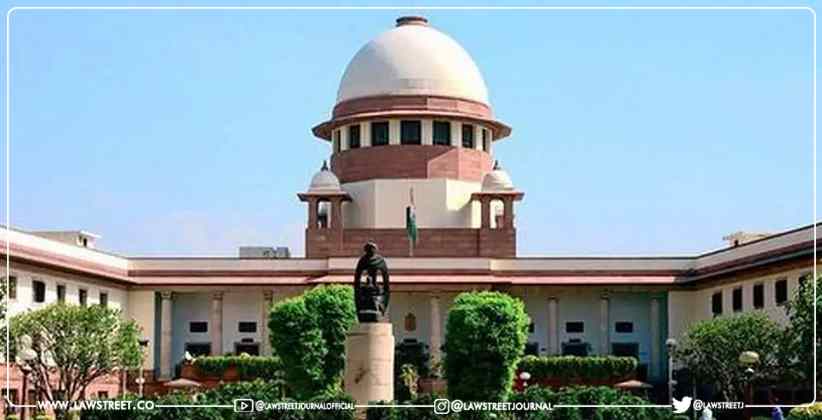The Supreme Court on April 1 , 2022 expressed concerns at the pendency of execution proceedings for executing the award in Arbitration Matters before subordinate courts/executing courts in the State of Uttar Pradesh.
The Court observed that if the Award, under the Arbitration and Conciliation Act , 1996, is not executed at the earliest, it will frustrate the main aim and object of the Arbitration Act as well as the Commercial Courts Act, 2015 .
The Honble Court stated that
If the Award, under the Arbitration Act, is not executed at the earliest, it will frustrate the purpose and object of the Arbitration Act as well as the Commercial Courts Act .
Referring to the limitation period within which a commercial dispute was required to be decided and disposed off under the Commercial Court's Act, 2015 the bench said :
Even as per the new Commercial Courts Act, 2015 the commercial dispute is required to be decided and disposed of at the earliest and within the stipulated time provided under the Act, namely, one year. There must be number of such proceedings pending in the courts under the jurisdiction of the High Court of Judicature at Allahabad.
The Honble Court also directed the Registrar General of the High Court of Judicature at Allahabad and the Lucknow Bench to place on record ;-
- How many execution petitions to execute the Award both under the Arbitration Act, 1940 and under the Arbitration and Conciliation Act, 1996 are pending in the subordinate courts/executing courts in the entire State;
- How many Section 34 applications are pending in the entire State and from which year.
- How many Section 37 applications are pending before the High Court and from which year.
The bench in his observation issued directions while considering a Special Leave Petition assailing Allahabad High Court's order dated December 10, 2021.
In the impugned order, the High Court had refused to direct court of Additional Judge Small Causes / Civil Judge (Senior Division), Allahabad to expeditiously decide the Execution Case.
The Honble High Court held that
By means of the present petition, the petitioner has prayed for a direction to the court of Additional Judge Small Causes / Civil Judge (Senior Division), Allahabad to expeditiously decide the Execution Case No. 06 of 2003 in re: Chopra Fabricators vs Kashinath pending since 2003.
The Court is not inclined to issue directions in a matter such as the present merely because a party has moved this Court under Article 227 of the Constitution[1] to direct the concerned Court to decide the pending suit overriding several cases which are equally pressing and are pending, by granting priority to a particular case. The fact that a particular case requires urgent disposal is to be considered by the concerned Court itself.
Lastly the Honble Supreme Court observed that
This is a glaring example of frustrating the arbitration proceedings under the Arbitration Act. The Award has been passed in the year 1992 and the execution petition is of the year 2003, which is still reported to be pending.
It is very unfortunate that even after a period of 30 years, the party in whose favour the Award is passed is not in a position to enjoy the fruit of the litigation/Award. Even the execution petition is also pending for more than 19 years
JUDGEMENT
The Honble Apex Court held that:
Insofar as the present case is concerned, considering the fact that the Award which is sought to be executed is of the year 1992 and the execution proceedings are pending since 2003, we direct the executing court to finally decide and dispose of the execution petition within a period of four weeks from the date of receipt of the present order.
CASE TITLE:
M/S Chopra Fabricators And Manufacturers Pvt. Ltd. V Bharat Pumps And Compressors Ltd. & Anr.
Coram :
Hon'ble Mr. Justice M.R. Shah
Hon'ble Mrs. Justice B.V. Nagarathna
Citation - Special Leave To Appeal (C) No(S). 4654/2022
Counsel For Petitioner: Advocates Aarti Upadhyay Mishra, Rakesh U. Upadhyay And Rishabh Pandey
[1] Article 227 in The Constitution Of India 1950
227. Power of superintendence over all courts by the High Court
(1) Every High Court shall have superintendence over all courts and tribunals throughout the territories interrelation to which it exercises jurisdiction
(2) Without prejudice to the generality of the foregoing provisions, the High Court may
(a) call for returns from such courts;
(b) make and issue general rules and prescribe forms for regulating the practice and proceedings of such courts; and
(c) prescribe forms in which books, entries and accounts shall be kept by the officers of any such courts
(3) The High Court may also settle tables of fees to be allowed to the sheriff and all clerks and officers of such courts and to attorneys, advocates and pleaders practising therein: Provided that any rules made, forms prescribed or tables settled under clause ( 2 ) or clause ( 3 ) shall not be inconsistent with the provision of any law for the time being in force, and shall require the previous approval of the Governor
(4) Nothing in this article shall be deemed to confer on a High Court powers of superintendence over any court or tribunal constituted by or under any law relating to the Armed Forces








